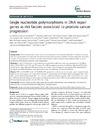Identificador persistente para citar o vincular este elemento:
https://accedacris.ulpgc.es/jspui/handle/10553/43030
| Título: | Single nucleotide polymorphisms in DNA repair genes as risk factors associated to prostate cancer progression | Autores/as: | Henríquez-Hernández, Luis Alberto Valenciano, Almudena Foro-Arnalot, Palmira álvarez-Cubero, María Jesús Cozar, José Manuel Suárez-Novo, José Francisco Castells-Esteve, Manel Fernández-Gonzalo, Pablo De-Paula-Carranza, Belén Ferrer, Montse Guedea, Ferrán Sancho-Pardo, Gemma Craven-Bartle, Jordi Ortiz-Gordillo, María José Cabrera-Roldán, Patricia Herrera-Ramos, Estefanía Rodríguez-Gallego, Carlos Rodríguez-Melcón, Juan Ignacio Lara, Pedro C. |
Clasificación UNESCO: | 320713 Oncología | Palabras clave: | Single Nucleotide Polymorphism ERCC1 ATM Prostate Cancer Openarray, et al. |
Fecha de publicación: | 2014 | Publicación seriada: | BMC Medical Genetics | Resumen: | Background: Besides serum levels of PSA, there is a lack of prostate cancer specific biomarkers. It is need to develop new biological markers associated with the tumor behavior which would be valuable to better individualize treatment. The aim of this study was to elucidate the relationship between single nucleotide polymorphisms (SNPs) in genes involved in DNA repair and prostate cancer progression.Methods: A total of 494 prostate cancer patients from a Spanish multicenter study were genotyped for 10 SNPs in XRCC1, ERCC2, ERCC1, LIG4, ATM and TP53 genes. The SNP genotyping was made in a Biotrove OpenArray (R) NT Cycler. Clinical tumor stage, diagnostic PSA serum levels, and Gleason score at diagnosis were obtained for all participants. Genotypic and allelic frequencies were determined using the web-based environment SNPator.Results: SNPs rs11615 (ERCC1) and rs17503908 (ATM) appeared as risk factors for prostate cancer aggressiveness. Patients wild homozygous for these SNPs (AA and TT, respectively) were at higher risk for developing cT2b - CT4 (OR = 2.21 (confidence interval (CI) 95% 1.47 - 3.31), p < 0.001) and Gleason scores = 7 (OR = 2.22 (CI 95% 1.38 - 3.57), p < 0.001), respectively. Moreover, those patients wild homozygous for both SNPs had the greatest risk of presenting D'Amico high-risk tumors (OR = 2.57 (CI 95% 1.28 - 5.16)).Conclusions: Genetic variants at DNA repair genes are associated with prostate cancer progression, and would be taken into account when assessing the malignancy of prostate cancer. | URI: | https://accedacris.ulpgc.es/handle/10553/43030 | ISSN: | 1471-2350 | DOI: | 10.1186/s12881-014-0143-0 | Fuente: | BMC Medical Genetics [EISSN 1471-2350], v. 15 (1), Article number: 143, (Diciembre 2014) |
| Colección: | Artículos |
Citas SCOPUSTM
17
actualizado el 08-jun-2025
Citas de WEB OF SCIENCETM
Citations
16
actualizado el 22-feb-2026
Visitas
58
actualizado el 11-ene-2026
Descargas
56
actualizado el 11-ene-2026
Google ScholarTM
Verifica
Altmetric
Comparte
Exporta metadatos
Los elementos en ULPGC accedaCRIS están protegidos por derechos de autor con todos los derechos reservados, a menos que se indique lo contrario.
